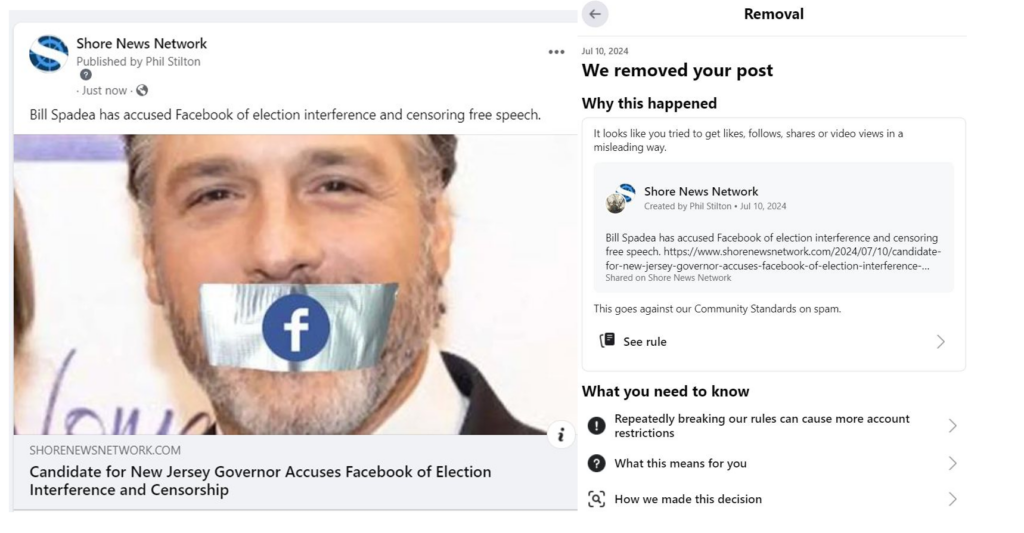Facebook’s position on limiting free speech has been a subject of debate, especially when it comes to election interference. The social media giant has faced numerous accusations of influencing U.S. elections through policy changes and censorship, often favoring certain political candidates and viewpoints.
Update: We have confirmed that Facebook is censoring and squelching New Jersey Republican candidate for Governor Bill Spadea. Moments after this article was published to Facebook, it was automatically removed. A further look into the matter showed that many people are reporting that Facebook is deleting posts made by and about Bill Spadea.
- Danny Zampella Bill, Facebook removed a post of yours I shared about you running for governor. Insanity.
- Rose Marie Nolan Sztybel I shared one of your posts and Facebook removed it. That’s ridiculous. There was nothing misleading or offensive about it.
- Bradford Kuiken Hey buddy Facebook is trying to censor you. [this user shared a similar image]
- Scott Card I guess FB doesn’t like you. [user shared similar image]
- Claudia Caro Esposito Omg, Facebook removed my post of you announcing running for governor
Dozens of other users have reported the same censorship.

New Jersey Republican candidate for Governor Bill Spadea said the platform has been censoring his posts, confirming an earlier report by Shore News Network that the platform is once again engaging in electing interference.
In that report, Shore News Network noted that many of its posts regarding the election news cycle have been flagged as spam, but falling short of being penalized with official policy violations such as the platform has issued in the past.
The post like many others being reported by non-left-aligned media and pundits was flagged as ‘spam’.
Yup. Facebook has blocked any post linking to our campaign site…accident? Big tech censoring the only conservative in the race? Hmmm… At least Elon Musk believes in the free exchange of ideas,” Spadea wrote on Twitter.
The timeline of Facebook’s election interference dates back to 2012 when the platform suspended a Veteran PAC for posting a meme related to the Benghazi attack, which ultimately benefited President Barack Obama. In 2016, Facebook suspended numerous pro-Trump pages and pro-Bernie Sanders groups. The platform was also accused of elevating liberal news in its Trending News section while blacklisting conservative figures like Ted Cruz and Rand Paul.
In 2018, Facebook censored various pro-life candidates, including Marsha Blackburn and Matt Rosendale. The censorship efforts reached a new height in 2020, with Facebook targeting Donald Trump’s campaign ads and anti-Biden content. The platform also suppressed the Hunter Biden laptop story, influenced by FBI warnings about potential “Russian propaganda.”
Meta’s censorship continued into 2022, focusing on Republican candidates such as Senate candidate Eric Greiten and gubernatorial candidates Kari Lake and Kay Ivey. By 2024, Meta platforms had censored presidential candidates RFK Jr., Larry Elder, and Jill Stein.
Donald Trump faced significant censorship in 2020, with his posts being limited and his account ultimately suspended after January 6, 2021. The platform also censored posts from Democratic Senator Elizabeth Warren. During the 2020 election, Facebook halted political advertising a week before the election, which critics argue disproportionately affected conservative candidates.
Despite Mark Zuckerberg’s public statements supporting free speech, Facebook’s actions often contradicted these assertions. In his 2019 Georgetown speech, Zuckerberg emphasized “giving everyone a voice,” but subsequent actions saw increased censorship aligned with recommendations from leftist groups. COO Sheryl Sandberg praised and implemented these recommendations, highlighting a significant shift from Zuckerberg’s professed ideals.
To address these issues, it is recommended that Speaker Mike Johnson (R-LA) direct relevant committees to investigate Facebook’s election interference. State legislatures, attorneys general, and secretaries of state should enforce laws to prevent Big Tech from engaging in viewpoint discrimination. Additionally, Facebook should establish a bipartisan commission to address election interference and censorship concerns.
In rare instances, Facebook has admitted to mistakes. During a Joe Rogan podcast, Zuckerberg acknowledged suppressing the New York Post Hunter Biden story under FBI pressure. Facebook also admitted to blocking links to damaging Democratic Party emails following WikiLeaks’ accusations of censorship.
Facebook’s involvement in U.S. elections reveals a complex interplay between free speech and censorship. The platform’s actions have often favored certain political outcomes, raising questions about its role in democratic processes and the need for greater accountability and transparency.
Facebook has denied allegations of restricting speech by non-left-wing aligned sources.

